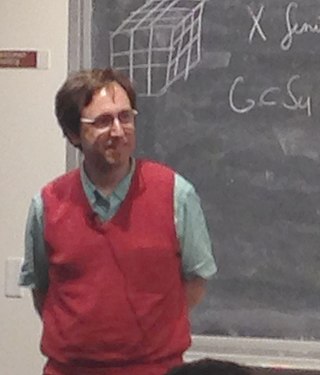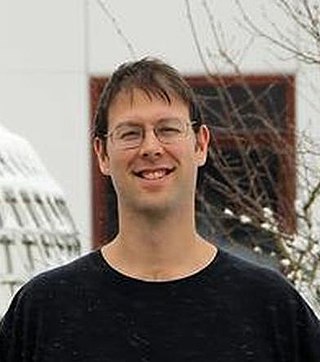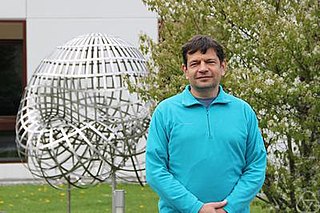Related Research Articles
In arithmetic combinatorics, Szemerédi's theorem is a result concerning arithmetic progressions in subsets of the integers. In 1936, Erdős and Turán conjectured that every set of integers A with positive natural density contains a k-term arithmetic progression for every k. Endre Szemerédi proved the conjecture in 1975.

Endre Szemerédi is a Hungarian-American mathematician and computer scientist, working in the field of combinatorics and theoretical computer science. He has been the State of New Jersey Professor of computer science at Rutgers University since 1986. He also holds a professor emeritus status at the Alfréd Rényi Institute of Mathematics of the Hungarian Academy of Sciences.

Jean Louis, baron Bourgain was a Belgian mathematician. He was awarded the Fields Medal in 1994 in recognition of his work on several core topics of mathematical analysis such as the geometry of Banach spaces, harmonic analysis, ergodic theory and nonlinear partial differential equations from mathematical physics.

Terence Chi-Shen Tao is an Australian mathematician. He is a professor of mathematics at the University of California, Los Angeles (UCLA), where he holds the James and Carol Collins chair. His research includes topics in harmonic analysis, partial differential equations, algebraic combinatorics, arithmetic combinatorics, geometric combinatorics, probability theory, compressed sensing and analytic number theory.

Gerhard Ringel was a German mathematician. He was one of the pioneers in graph theory and contributed significantly to the proof of the Heawood conjecture, a mathematical problem closely linked with the four color theorem.

Ben Joseph Green FRS is a British mathematician, specialising in combinatorics and number theory. He is the Waynflete Professor of Pure Mathematics at the University of Oxford.
The Ostrowski Prize is a mathematics award given every odd year for outstanding mathematical achievement judged by an international jury from the universities of Basel, Jerusalem, Waterloo and the academies of Denmark and the Netherlands. Alexander Ostrowski, a longtime professor at the University of Basel, left his estate to the foundation in order to establish a prize for outstanding achievements in pure mathematics and the foundations of numerical mathematics. It currently carries a monetary award of 100,000 Swiss francs.

Peter Clive Sarnak is a South African-born mathematician with dual South-African and American nationalities. Sarnak has been a member of the permanent faculty of the School of Mathematics at the Institute for Advanced Study since 2007. He is also Eugene Higgins Professor of Mathematics at Princeton University since 2002, succeeding Sir Andrew Wiles, and is an editor of the Annals of Mathematics. He is known for his work in analytic number theory. He also sits on the Board of Adjudicators and the selection committee for the Mathematics award, given under the auspices of the Shaw Prize.
In mathematics, arithmetic combinatorics is a field in the intersection of number theory, combinatorics, ergodic theory and harmonic analysis.
The mathematical disciplines of combinatorics and dynamical systems interact in a number of ways. The ergodic theory of dynamical systems has recently been used to prove combinatorial theorems about number theory which has given rise to the field of arithmetic combinatorics. Also dynamical systems theory is heavily involved in the relatively recent field of combinatorics on words. Also combinatorial aspects of dynamical systems are studied. Dynamical systems can be defined on combinatorial objects; see for example graph dynamical system.

Elon Lindenstrauss is an Israeli mathematician, and a winner of the 2010 Fields Medal.

Harald Andrés Helfgott is a Peruvian mathematician working in number theory. Helfgott is a researcher at the CNRS at the Institut Mathématique de Jussieu, Paris.
Lawrence David Guth is a professor of mathematics at the Massachusetts Institute of Technology.

Jacob Fox is an American mathematician. He is a current professor at Stanford University. His research interests are in Hungarian-style combinatorics, particularly Ramsey theory, extremal graph theory, combinatorial number theory, and probabilistic methods in combinatorics.
Nets Hawk Katz is the W.L. Moody Professor of Mathematics at Rice University. He was a professor of mathematics at Indiana University Bloomington until March 2013 and the IBM Professor of Mathematics at the California Institute of Technology until 2023.
Bryna Rebekah Kra is an American mathematician and Sarah Rebecca Roland Professor at Northwestern University who is on the board of trustees of the American Mathematical Society and was elected the president of American Mathematical Society in 2021. As a member of American Academy of Arts and Sciences and National Academy of Sciences, Kra has made significant contributions to the structure theory of characteristic factors for multiple ergodic averages. Her academic work centered on dynamical systems and ergodic theory, and uses dynamical methods to address problems in number theory and combinatorics.

Zeev Rudnick or Ze'ev Rudnick is a mathematician, specializing in number theory and in mathematical physics, notably quantum chaos. Rudnick is a professor at the School of Mathematical Sciences and the Cissie and Aaron Beare Chair in Number Theory at Tel Aviv University.

József Solymosi is a Hungarian-Canadian mathematician and a professor of mathematics at the University of British Columbia. His main research interests are arithmetic combinatorics, discrete geometry, graph theory, and combinatorial number theory.
Melody Tung Chan is an American mathematician and violinist who works as Associate Professor of Mathematics at Brown University. She is a winner of the Alice T. Schafer Prize and of the AWM–Microsoft Research Prize in Algebra and Number Theory. Her research involves combinatorial commutative algebra, graph theory, and tropical geometry.
References
- 1 2 "Alexander Gamburd". CUNY Graduate Center. Retrieved Aug 14, 2020.
- ↑ Shim, Katherine (October 23, 1992). "Colloquium Gets Mixed Review" (PDF). The MIT Tech. p. 1. Retrieved Aug 18, 2020.
- 1 2 3 "Math professor Alexander Gamburd wins Presidential Early Career Award". University of California, Santa Cruz. Dec 18, 2008. Retrieved Aug 14, 2020.
- ↑ Alexander Gamburd at the Mathematics Genealogy Project
- ↑ "Alexander Gamburd at the Institute for Advanced Study". 9 December 2019. Retrieved Aug 14, 2020.
- ↑ "Sloan Research Fellowships awarded to three UC Santa Cruz faculty". University of California, Santa Cruz. February 25, 2007.
- ↑ "Past Sloan Fellows". Alfred P. Sloan Foundation. Retrieved August 14, 2020.
- ↑ "CAREER: Expander Graphs: Interactions between Arithmetic, Group Theory and Combinatorics" . Retrieved August 14, 2020.
- ↑ "The Presidential Early Career Award for Scientists and Engineers: Recipient Details" . Retrieved Aug 14, 2020.